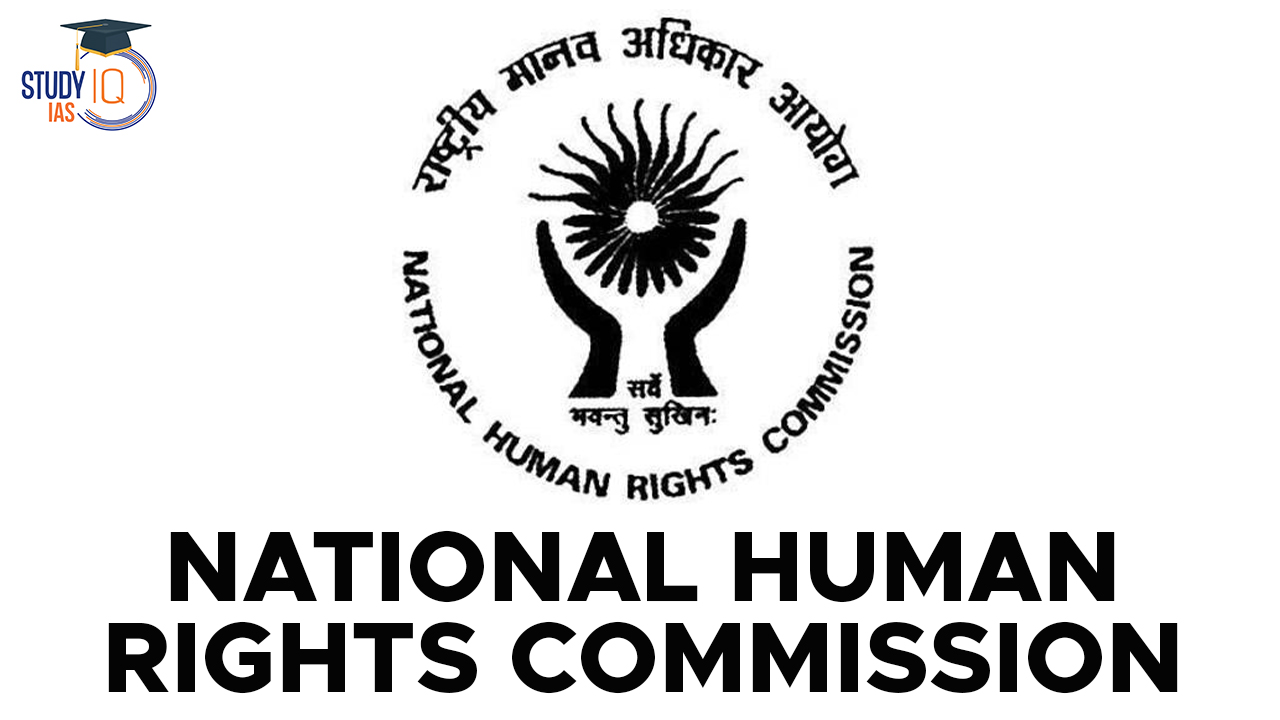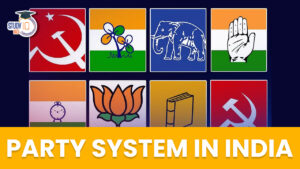Table of Contents
Recently a high-power committee led by the Prime Minister met to select the next Chairperson of the National Human Rights Commission (NHRC). The post of Chairperson has been vacant since Justice (Retd) Arun Kumar Mishra completed his tenure in June 2024.
About National Human Rights Commission (NHRC)
- It is a statutory body set up under the Protection of Human Rights Act (PHRA), 1993.
- It is the watchdog of human rights in the country & works to protect the right to life, liberty, equality and dignity of the individual guaranteed by the Constitution.
The NHRC investigates
- human rights violations,
- reviews legal protections, and
- recommends ways to improve their implementation.
The National Human Rights Commission (NHRC) acts as a watchdog for human rights in India. Its main job is to protect individuals’ rights to life, liberty, equality, and dignity, as guaranteed by the Indian Constitution and international agreements. The NHRC’s headquarters is in New Delhi, and it can set up offices in other locations across India. The National Human Rights Commission is an important part of Indian Polity which is an important subject in the UPSC Syllabus. Students can also go for the UPSC Mock Test to get more accuracy in their preparations.
History of NHRC
- The Universal Declaration of Human Rights (UDHR) was adopted by the United Nations General Assembly on December 10 in Paris. The protection of human rights was advanced through this action, which proved to be a turning point in human history.
- Soon after that, in 1991, National Human Rights Institutions, or NHRIs as they are more commonly known, introduced the Paris Principles. These principles were endorsed by the United Nations General Assembly in 1993, and India also passed the Human Rights Protection Act that year.
- The National Human Rights Commission’s first foundation was set at this time. Large organisations began to recognise the value of protecting human rights, which led to the UN’s acceptance of the Paris Principles.
- In line with these principles, India advanced and welcomed the creation of the Human Rights Act in 1993. Even the state governments in India were permitted and compelled to establish the Human Rights Commission by the higher court and the constitution.
What are Human Rights?
According to the UN, human rights are rights that belong to everyone, regardless of race, gender, nationality, or any other status. These rights include the right to life and liberty, freedom from slavery and torture, and the right to work and education, among others. Human Rights Day is celebrated on December 10 each year
Composition and Qualifications of NHRC Members
The National Human Rights Commission (NHRC) is made up of a Chairperson, who is a retired Chief Justice of India or a Supreme Court judge, along with four other knowledgeable members. It also includes the Chairpersons of the National Commissions for Minorities, Scheduled Castes, Scheduled Tribes, and Women as ex-officio members.
The NHRC has:
- One member who is or has been a Supreme Court judge.
- One member who is or has been the Chief Justice of a High Court.
- Three members with experience in human rights.
The President of India appoints the Chairperson and other members based on recommendations from a committee that includes the Prime Minister, the Home Minister, the Leaders of the Opposition in both Houses, and the Speaker of the Lok Sabha. Members serve a term of five years or until they turn 70, whichever comes first. The first Chairperson of the NHRC was Justice Ranganath Mishra, who served from 1993 to 1996.
| NHRC Composition and Qualifications |
|
| Chairperson | Must be a former Chief Justice of India or a Judge of the Supreme Court. |
| Five Members | One must be or have been a Judge of the Supreme Court. |
| One must be or have been a Chief Justice of a High Court. | |
| Three members should have knowledge of or practical experience in human rights issues, with at least one being a woman. | |
| Seven Deemed Members |
|
Appointment Process of NHRC Members
To become a member of the National Human Rights Commission (NHRC), candidates must meet specific requirements. A selection committee recommends candidates to the President of India. This committee is carefully chosen because the NHRC plays an important role in the country’s development.
| This selection panel consists of: |
|
Term
The Chairperson or the Members of the National Human Rights Commission hold office for a term of 3 years or until they attain the age of 70 years, whichever is earlier.
Removal Ground for NHRC Members
The chairperson or any member can be removed by the President due to proven misbehaviour or incapacity following a Supreme Court inquiry.
| Removal may also occur if the individual: |
|
Functions of NHRC
- Inquiry into Violations: Investigates complaints about human rights breaches, abetment, or negligence by public servants.
- Court Intervention: Can intervene in court proceedings involving human rights allegations with the court’s approval.
- Institution Visits: Inspects jails and other state-controlled facilities to assess and recommend improvements for the living conditions of inmates.
- Review of Safeguards: Reviews constitutional and legal protections for human rights and suggests ways for their effective implementation.
- Addressing Inhibitors: Examines issues like terrorism that impact human rights enjoyment and proposes suitable corrective actions.
- Treaty Studies: Analyses international human rights treaties and instruments to offer recommendations.
- Human Rights Research: Conducts and promotes research in the human rights field.
- Promoting Awareness: Enhances human rights awareness and literacy through education and public outreach.
- Supporting NGOs: Supports the activities of non-governmental organisations and institutions working to advance human rights.
Powers of NHRC
- Civil Court Powers: Possesses the same powers as a civil court under the Code of Civil Procedure, 1908, during investigations, including summoning witnesses, document production, and evidence reception.
- Compensation Recommendation: Authorised to recommend compensation for victims of human rights violations.
- Legal Enforcement: Can approach the Supreme Court or High Court to enforce human rights protections.
- Suo Moto Cognizance: Empowered to independently recognize and act on human rights violations without needing a formal complaint.
Amendment of Protection of Human Rights (Amendment) Bill
Amended by the Protection of Human Rights (Amendment) Act, 2006, and Human Rights (Amendment) Act, 2019.
| Protection of Human Rights (Amendment) Bill 2019 | |
| Eligibility for Chairperson | The amendment made a person who has been a Judge of the Supreme Court eligible to be appointed as Chairperson of the NHRC, in addition to the person who has been the Chief Justice of India. |
| Increase in Members | The number of members of the commission with knowledge of human rights issues was increased from two to three, with at least one member required to be a woman. |
| Deemed Members | The Chairperson of the National Commission for Backward Classes, the Chairperson of the National Commission for the Protection of Child Rights, and the Chief Commissioner for Persons with Disabilities were included as deemed Members of the Commission. |
| Term of Office | The term of the Chairperson and Members of the Commission and the State Commissions was reduced from five to three years, and they are now eligible for re-appointment. |
| Eligibility for State Commission Chairperson | A person who has been a Judge of the High Court is also made eligible to be appointed as Chairperson of the State Commission, in addition to the person who has been the Chief Justice of the High Court. |
| Powers of Secretary-General | The Secretary-General of the NHRC and the Secretary of a State Human Rights Commission (SHRC) can exercise all administrative and financial powers, subject to the respective chairperson’s control. |
| Union Territories | The amendment conferred upon State Commissions the functions relating to human rights being discharged by Union territories, except for the Union territory of Delhi, which will be dealt with by the NHRC. |
Role of NHRC Regarding Armed Forces
The National Human Rights Commission (NHRC) has limited powers when it comes to human rights violations by the armed forces. It can request reports from the Central Government and make recommendations. The government must inform the NHRC about actions taken on these recommendations within three months.
NHRC Reports
The NHRC submits annual and special reports to the Central and State Governments. These reports are presented to the State Legislatures along with details on what actions were taken or reasons for not accepting any recommendations.
Issues Addressed by NHRC
The NHRC tackles a variety of human rights issues in India, including:
- Arbitrary arrests and detentions
- Custodial torture and deaths
- Fake encounters
- Communal violence
- Atrocities against women and children
- Non-payment of retirement benefits
- Child labor
- Extra-judicial killings
- Sexual violence
- LGBTQ rights
- Issues affecting SCs/STs and disabled individuals
- Labor rights
- Internal displacement due to conflict
- Manual scavenging
Strategy for improvement
To improve its effectiveness, the NHRC could:
- Provide training for its members and staff.
- Include diverse members from various backgrounds.
- Improve infrastructure and ensure consistent funding.
- Conduct investigations in a timely manner.
- Make NHRC decisions enforceable to strengthen its authority.
- Simplify the complaint process and enhance case management.
- Increase public outreach through social media and public hearings.
- Collaborate with civil society organizations to promote human rights effectively.
National Human Rights Committee Limitations
When looking into the alleged encounter deaths in Manipur, former Chief Justice of India H.L. Dattu himself referred to the NHRC as a helpless organisation and a “toothless tiger” since it lacked the necessary resources to handle such matters. The NHRC has no power to impose decisions; it may only issue recommendations. The judgement can also be rejected outright as a result of this lack of authority to ensure compliance.
It lacks impartial investigating tools. According to the Protection of Human Rights Act of 1993, human rights commissioners are not allowed to look into an incident if a complaint is made more than a year after it happened. As a result, a significant number of valid complaints go unaddressed.
A lot of judges, police officers, and politically powerful bureaucrats saw it as a place to retire to. The work of the commission is further impeded by ineffective bureaucracy and a lack of funding. Due to its inability to grant redress, it can only ask the authorities to go before higher courts to help the victims. The responsible authority shall implement its suggestions or explain its reasons therefor within one month.
About Global Alliance of National Human Rights Institutions
| Aspect | Details |
| Origin | Founded in 1993 in Tunis, Tunisia as the International Coordinating Committee; renamed GANHRI in 2016. |
| Headquarters | Geneva, Switzerland |
| Vision | Aims for a world where everyone fully enjoys their human rights. |
| Tripartite Partnership | Collaborates with the United Nations Development Programme (UNDP) and Office of the United Nations High Commissioner for Human Rights (OHCHR) to strengthen National Human Rights Institutions (NHRIs) globally. |
| Membership | Consists of 115 NHRIs from all regions of the world. |
| Unique Feature | Only non-UN body with an accreditation system based on 1993 Paris Principles giving access to the UN. |
| Paris Principles | Set of international standards for NHRIs, adopted by the UN General Assembly in 1993. |
| Accreditation Rating | Managed by a subcommittee with an A-status NHRI representative from each regional network. |
| Sub-Committee on Accreditation | Handles peer review for initial accreditation and re-accreditation every five years. |
| Status Descriptions |
|
National Human Rights Commission UPSC
The NHRC’s authority could be increased in a number of ways to increase its effectiveness and efficiency in the process of bringing victims of human rights violations to justice. The NHRC needs to be given authority and must be free from political and administrative interference in order to efficiently carry out its duties. It must be given the discretion to make choices that will actually and significantly affect the situation. Students can read all the details related to UPSC by visiting the official website of StudyIQ UPSC Online Coaching.
| UPSC PYQ |
Consider the following organisations/ bodies in India: (2023)
How many of the above are constitutional bodies?
Answer: A |


 Maharashtra Bill to Curb Urban Naxalism,...
Maharashtra Bill to Curb Urban Naxalism,...
 Party System in India, Feature, Importan...
Party System in India, Feature, Importan...
 Consolidated Fund of India, Meaning and ...
Consolidated Fund of India, Meaning and ...





















